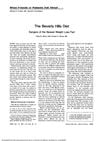 July 2011 in “Springer eBooks”
July 2011 in “Springer eBooks” The document concluded that FDA-approved treatments like minoxidil and finasteride are effective for hair loss, while the effectiveness of natural remedies and other non-approved treatments is not well-supported by evidence.
 June 2011 in “The Journal for Nurse Practitioners”
June 2011 in “The Journal for Nurse Practitioners” Up to half of adult women may experience hair loss, and doctors should use medical history, exams, and tests to find the cause and treat it.
 29 citations,
May 1998 in “Bulletin of the American College of Nurse-Midwifery”
29 citations,
May 1998 in “Bulletin of the American College of Nurse-Midwifery” The document concludes that menopause should be seen as a natural part of aging and managed with personalized care and informed choices.
[object Object]  18 citations,
January 2001 in “Annual Reports in Medicinal Chemistry”
18 citations,
January 2001 in “Annual Reports in Medicinal Chemistry” Selective Androgen Receptor Modulators (SARMs) are drugs that can control the effects of androgens in different tissues, potentially having fewer side effects and promising for treating various conditions.
 October 2023 in “European medical journal. Dermatology”
October 2023 in “European medical journal. Dermatology” Hair loss greatly affects quality of life, and dermatologists are crucial for proper diagnosis and treatment.
 34 citations,
March 2001 in “Cleveland Clinic Journal of Medicine”
34 citations,
March 2001 in “Cleveland Clinic Journal of Medicine” Manage hair shedding by identifying triggers, possibly using supplements or medications, and tracking with a health calendar.
 19 citations,
August 2020 in “Gastroenterology report”
19 citations,
August 2020 in “Gastroenterology report” There is no standard treatment for the rare Cronkhite–Canada syndrome, which can be fatal and lead to cancer.
 18 citations,
November 1981 in “JAMA”
18 citations,
November 1981 in “JAMA” The Beverly Hills Diet is unscientific, potentially harmful, and could cause serious health issues.
 May 2023 in “Frontiers in veterinary science”
May 2023 in “Frontiers in veterinary science” A young tapir with a rare skin condition improved after treatment with wound cleaning, cream, and oral medication.

Use the least toxic, most specific treatments for skin diseases, considering side effects and individual patient needs.
 June 1996 in “Irish Journal of Medical Science (1971 -)”
June 1996 in “Irish Journal of Medical Science (1971 -)” The document summarizes medical findings on topics like heart rhythm treatment, sleep apnea therapy, and various health conditions and treatments.
 July 2022 in “Jurnal Farmasi Galenika (Galenika Journal of Pharmacy)”
July 2022 in “Jurnal Farmasi Galenika (Galenika Journal of Pharmacy)” Older men with diabetes were more likely to get severe COVID-19 and needed treatments like antivirals for about 2-3 weeks.
 July 2022 in “Jurnal Farmasi Galenika (Galenika Journal of Pharmacy)”
July 2022 in “Jurnal Farmasi Galenika (Galenika Journal of Pharmacy)” Older men with diabetes were more likely to get severe COVID-19 and needed treatments like antivirals for about 2-3 weeks.
 7 citations,
January 2017 in “Clinical and medical investigations”
7 citations,
January 2017 in “Clinical and medical investigations” Suriname uses many plants for beauty, with potential for a beauty industry, but more evidence is needed for product effectiveness.
86 citations,
November 2020 in “Annals of Oncology” Early intervention and tailored management can reduce skin side effects from cancer treatments.
 22 citations,
January 1985 in “Annals of Internal Medicine”
22 citations,
January 1985 in “Annals of Internal Medicine” Minoxidil in breast milk may harm nursing infants.
11 citations,
March 2021 in “Cleveland Clinic Journal of Medicine” Treating hair loss in both men and women is effective and improves quality of life.
 4 citations,
February 2022 in “International Journal of Molecular Sciences”
4 citations,
February 2022 in “International Journal of Molecular Sciences” Myotonic Dystrophy may age cells faster, and drugs that target aging could be potential treatments.
 2 citations,
June 2023 in “Food science & nutrition”
2 citations,
June 2023 in “Food science & nutrition” Eating apples can help prevent heart disease, cancer, and other conditions because they have healthy plant chemicals.
2 citations,
January 2019 in “Journal of Cosmetics, Dermatological Sciences and Applications” The supplement and lotion significantly reduced hair loss and improved hair health.
 1 citations,
June 2023 in “Genes”
1 citations,
June 2023 in “Genes” Hair loss from Alopecia Areata is caused by both genes and environment, with several treatments available but challenges in cost and relapse remain.
 August 2024 in “Applied Sciences”
August 2024 in “Applied Sciences” Plant extracts may help prevent or reverse hair graying.
March 2023 in “Advances in Clinical and Experimental Medicine” Oral and topical finasteride are effective and safe for treating female hair loss.
[object Object]  16 citations,
November 2021 in “Antioxidants”
16 citations,
November 2021 in “Antioxidants” Managing oxidative stress might help treat low testosterone and related chronic diseases in aging men.
4 citations,
July 2019 in “Vestnik Rossiĭskoĭ akademii meditsinskikh nauk / Rossiĭskaia akademiia meditsinskikh nauk” Both genetics and lifestyle factors contribute to male pattern baldness.
 3 citations,
February 2023 in “International Journal of Molecular Sciences”
3 citations,
February 2023 in “International Journal of Molecular Sciences” Autologous Platelet and Extracellular Vesicle-Rich Plasma (PVRP) has potential in enhancing tissue regeneration and improving hair conditions, but its effectiveness varies due to individual differences.
April 2024 in “International journal of molecular sciences” Alopecia areata and vitiligo share immune system dysfunction but differ in specific immune responses and affected areas.
 February 2024 in “International Journal of Molecular Sciences”
February 2024 in “International Journal of Molecular Sciences” Hair loss in Androgenetic Alopecia is caused by genetics, aging, and lifestyle, leading to hair follicle shrinkage and related health risks.
 May 2023 in “Journal of Clinical Medicine”
May 2023 in “Journal of Clinical Medicine” New understanding and treatments for hair loss are improving, but more research is needed.
June 2019 in “International journal of dermatology and venereology” The Hedgehog Signaling Pathway is important for skin and hair development and skin cancer treatment, but more research is needed to understand it fully.






















